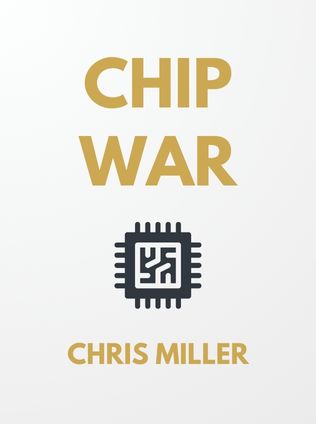
Chip War
The Fight for the World's Most Critical Technology
By Chris Miller
Published 10/2022
About the Author
Chris Miller is an accomplished economic historian and a prominent scholar in the field of geopolitics and technology. His research focuses on the intersection of economic policy, technology, and global power dynamics. Miller has gained significant recognition for his ability to dissect complex economic and technological subjects and make them accessible to a broader audience. In Chip War, Miller combines his deep knowledge of history, economics, and geopolitics to explore the semiconductor industry's pivotal role in shaping the modern world.
Miller's academic background and professional experience allow him to provide readers with a comprehensive understanding of how semiconductors have become a cornerstone of both economic development and geopolitical strategy. His ability to weave together historical context, technological advancements, and global power struggles makes Chip War a compelling and insightful read.
Main Idea
The main idea of Chip War is the exploration of the rise and development of the semiconductor industry and its crucial role in shaping the modern digital world. Miller argues that semiconductor chips, the tiny components that control the flow of electricity in electronic devices, have become the lifeblood of the digital age. These chips are integral to everything from personal computers and smartphones to household appliances and advanced military systems.
Miller further contends that the semiconductor industry has become a focal point of geopolitical power. The ability to produce and control these chips has significant implications for national security, economic strength, and global influence. As a result, countries around the world have sought to dominate the semiconductor industry, leading to intense competition and strategic maneuvering on the global stage.
Table of Contents
- Introduction: The Importance of Semiconductors
- The Birth of the Semiconductor Industry
- The Cold War and the Military Push for Technology
- From Vacuum Tubes to Transistors
- The Rise of the Chip Industry
- The Japanese Challenge
- The Emergence of Taiwan and the Foundry Model
- The Globalization of the Chip Supply Chain
- China's Ambitions in the Semiconductor Industry
- The Geopolitical Implications of the Chip War
- Conclusion: The Future of the Semiconductor Industry
Introduction: The Importance of Semiconductors
Semiconductors are the unsung heroes of the modern digital world. These tiny chips, which control the flow of electricity in electronic devices, have become the foundation upon which our digital society is built. From the smartphones in our pockets to the satellites orbiting the Earth, semiconductors are at the heart of nearly every electronic device we use today.
Miller begins Chip War by emphasizing the significance of semiconductors in the global economy. He notes that the semiconductor industry has grown exponentially over the past few decades, becoming a trillion-dollar industry that powers the global economy. The ubiquity and utility of these chips have made them a critical resource that countries around the world seek to control and dominate.
The Birth of the Semiconductor Industry
The story of the semiconductor industry begins in the immediate aftermath of World War II. A handful of engineers and entrepreneurs in the United States recognized the vast potential of semiconductors for military applications. The Cold War, which followed closely on the heels of World War II, created an unprecedented demand for advanced technology, particularly in the fields of computing and communications.
It was in this context that the modern semiconductor industry was born. Engineers like William Shockley, John Bardeen, and Walter Brattain at Bell Labs made groundbreaking discoveries in the field of semiconductors, leading to the invention of the transistor in 1947. This invention would prove to be a game-changer, paving the way for the development of smaller, faster, and more efficient electronic devices.
Sign up for FREE and get access to 1,400+ books summaries.
You May Also Like
Rich Dad Poor Dad
What the Rich Teach Their Kids About Money - That the Poor and Middle Class Do Not!
By Robert T. KiyosakiFreakonomics
A Rogue Economist Explores the Hidden Side of Everything
By Steven D. Levitt and Stephen J. DubnerFactfulness
Ten Reasons We're Wrong About the World – and Why Things Are Better Than You Think
By Hans Rosling



















